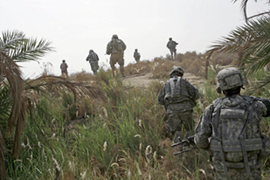Talks on US-Iraq pact at ‘dead end’
Maliki calls unacceptable US demands that “hugely infringe on sovereignty of Iraq”.

“We have reached a dead end, because when we started the talks, we found that the US demands hugely infringe on the sovereignty of Iraq, and this we can never accept,” al-Maliki said during a visit to Jordan on Friday.
US immunity
In his first detailed comments on the talks, he said Iraq objected to Washington‘s insistence on giving its troops immunity from prosecution in Iraq and freedom to conduct operations independent of Iraqi control.
| Your Views |
|
Should the US have a long term presence in Iraq? |
“We can’t extend the US forces permission to arrest Iraqis or to undertake terror fighting in an independent way, or to keep Iraqi skies and waters open for themselves whenever they want,” al-Maliki said.
“One of the important issues that the US is asking for is immunity for its soldiers and those contracting with it. We reject this totally.”
Adam Ereli, public affairs counsellor at the US embassy in Baghdad, told Al Jazeera that the pact was not dead and Washington “would go back to the drawing board” to see what it could change to make the document acceptable to the Iraqis.
“Iraq has concerns, Iraq’s sovereignty needs to be respected, we agree with that and there are issues that need to be worked through, he said.
“Those take time to work out, and frankly that’s not unique to this case. We have, so far, agreements with 80 others countries, the same thing we are trying to make with Iraq, and those countries had concerns.”
The Bush administration also said on Friday that it would continue to seek a deal with Baghdad.
“We fully respect their sovereignty – it is, after all, what we fought for in the liberation,” Dana Perino, White House spokeswoman, said, referring to the US-led invasion in 2003 which toppled Saddam Hussein.
July deadline
Officials in Baghdad and Washington said two weeks ago that the Status of Forces Agreement, or Sofa, would be settled by the end of July.
But Khalaf al-Olayan, a Sunni bloc leader in Iraq’s parliament, told Al Jazeera: “It’s not possible to finalise an agreement of this importance so quickly.
“The timing is extremely tight.
“[The proposed agreement] has to be presented first to the Iraqi parliament or put to a national referendum because there are very important issues regarding national sovereignty.”
George Bush, the US president, said on Wednesday that he was confident of reaching an agreement with Iraq.
Members of Iraq’s parliament say they are facing US pressure to meet deadlines on issues that should take months to resolve.
Last week a majority of them wrote to the US congress rejecting a long-term security deal with Washington if it is not linked to a requirement that US forces leave.
“The majority of Iraqi representatives strongly reject any military-security, economic, commercial, agricultural, investment or political agreement with the United States that is not linked to clear mechanisms that obligate the occupying American military forces to fully withdraw from Iraq,” the letter to the leaders of Congress said.
On schedule
However, David Satterfield, the US state department’s senior adviser on Iraq, has said the agreement is on schedule.
 |
| Maliki said Washington wanted to be able to conduct operations without Iraqi control [AFP] |
Speaking in Baghdad on Tuesday, Satterfield said: “We are confident it can be achieved, and by the end of July deadline.
“Your question may be, ‘well, what if you aren’t finished by then?’ We believe this is do-able by the end of July, so does the Iraqi side.”
Talks over the issue have been shrouded in secrecy but a senior Iraqi source told Al Jazeera that there have been several areas that have alarmed Iraqi negotiators.
In particular, Iraqis are fighting a push by the Bush administration for permanent military bases in the country and for US private security contractors to be given immunity from Iraqi law, Al Jazeera’s Ghida Fakhry said.
“If the original deadline is missed, it could mean that major obstacles have emerged and that the plan to rush through a deal before George Bush steps down as president might also be in jeopardy,” she said.